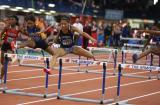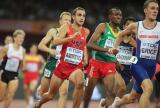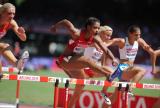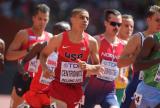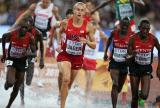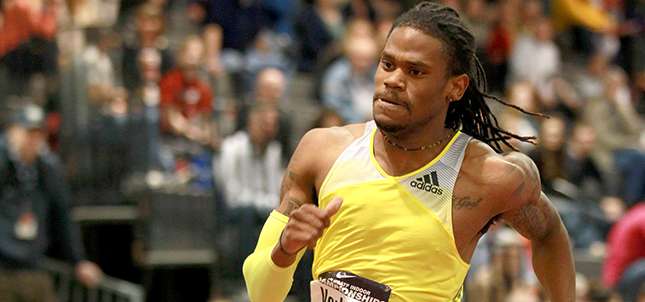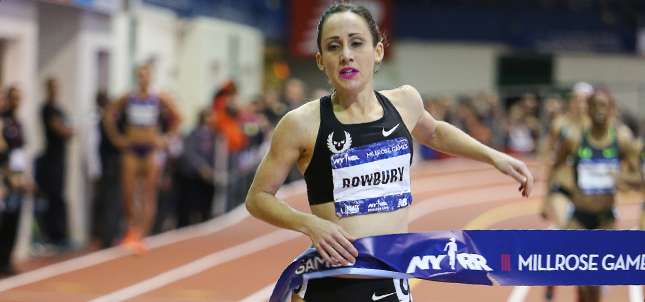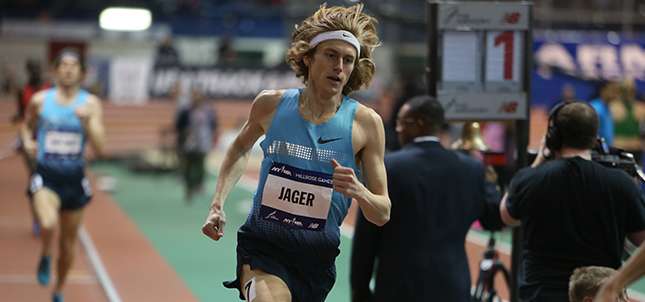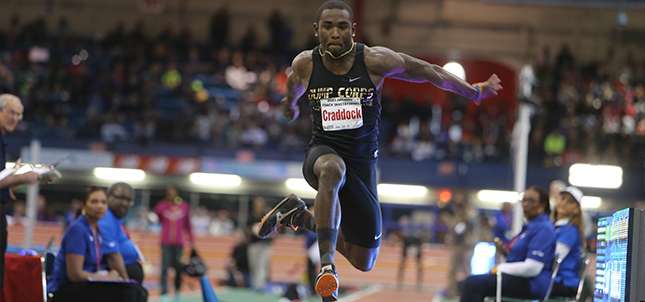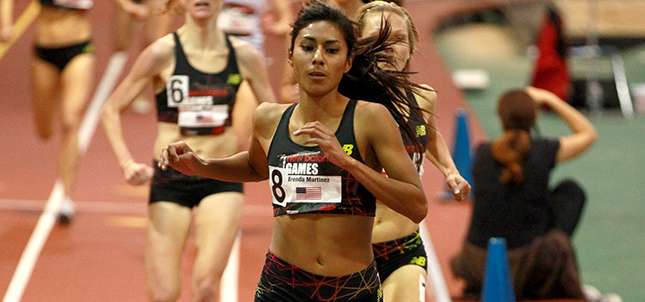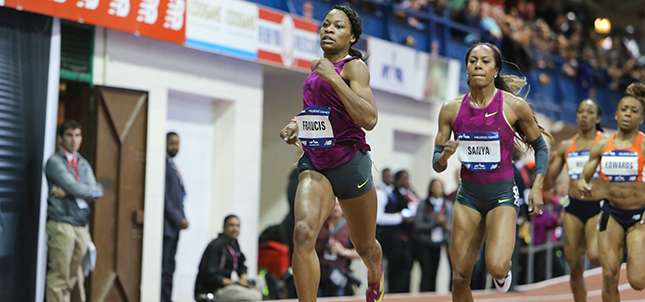Folders |
Armory Follows 10 IAAF World Championships Competitors: Recap ThreePublished by
This is part three of following 10 athletes who have made major impacts at The Armory as they compete at IAAF World Championships in Beijing, China. Those athletes are David Verburg, Erik Sowinski, Matthew Centrowitz, Evan Jager, Omar Craddock, Sharika Nelvis, Phyllis Francis, Brenda Martinez, Shannon Rowbury and Janeva Stevens. This is not to say we won’t be mentioning others, but those 10 will be the main focus in our recaps, which will be posted on August 23, 25, 27, 29 and 30. By Elliot Denman // Photos by Victah Sailer and John Nepolitan
BEIJING – Armory veterans Matthew Centrowitz, Robby Andrews and Leo Manzano have passed their first tests at the 15th edition of the World Track and Field Championships. Team USA's 1500 meter delegation did it in divergent fashion, but all reached their destination – the second and semifinal round of the event on Friday night at the Bird's Nest Stadium. With three first-round heats listed Thursday morning, and the top six in each heat, along with the six next fastest advancing, Manzano (3:39:22) and Centrowitz (3:43.17) did it by the automatic group, but Andrews (3:38.52) was the fastest of all the Americans, even in seventh place in his section. Centro, aiming for his third consecutive World medal – he took the silver at Moscow in 2013 and the bronze at Daegu in 2011 – ran it as economically and strategically as he could, taking third place in the opening heat won by Kenya's Elijah Manangoi (3:42.57.) The pace quickened in section two, won by two-time defending World Champion Asbel Kiprot of Kenya in 3:38.97, but Manzano had plenty left and snared another third, at 3:39.22. Among other things, Kiprot's goal is to complete a decade of brilliance at Worlds. He was fourth in this race in 2007 and 2009 before moving up to gold in 2011-13. Now, knowing what it would take to advance on time, there was no dawdling in race three. And sure enough, all the "next fastest" came from this one. As Silas Kiplagat of Kenya, sixth in 2013 and second in 2011, was winning it in 3:38:13, Andrews was keeping all his composure, hugging the rail to run no extra distance, and squeezing through the tightly-formed lead pack for his 3:38.52 seventh-place qualifier. "They're making it tougher for all of us this year and I don't know why," said Manzano, the 2012 Moscow Olympic silver medalist. "Usually, at Worlds or Olympics, they schedule a day off between each round, but here they have us running Thursday-Friday-Sunday. For whatever reason, it beats me." Centro, too, was critical of this scheduling, but knew he'd just have to deal with it. "Three races in four days – I've never done that before," he said. "But we'll just have to see how it all plays out. There are a lot of big kickers here. It's going to be very interesting."
Cam Levins can’t wait to step back onto the Armory track, scene of his magnificent, magical 3:54.74 mile/8:15.38 two-mile double – just 30 minutes apart – at the Armory Track Invitational seven months ago. He also can’t wait to disremember his performance at the 15th World Championships of track and field. Slowed by leg and ankle issues, the Southern Utah University graduate running for Canada, never could muster the strength to kick it in with some of the greats of the global distance game and finished with a non-qualifying 13:48.72 ninth place in his Wednesday morning trial of the men’s 5000 meters at the Worlds. “The way the race was run, I knew I’d have to go top five, but it just didn’t happen,” said Levins in the athletes’ mixed zone. Ethiopia’s Hagos Gebrhiwet led the race in 13:45.00. But countryman Yomif Kejelcha took the faster second section in 13:19.38 as all the qualifiers on time emerged from that section. While Levins is out, all three Americans are in – Ryan Hill (13:19.67), Galen Rupp (13:20.78) and Ben True (13:45.09.) “This was definitely disappointing to me,” said Levins. “I know there’s a lot of things I can do better as an athlete.” Tops on his list: Returning to the Armory for further stardom next winter, followed by even better things at the Canadian Olympic Trials and the Rio de Janeiro Olympic Games. On the way to all this, he’ll return to his training routine under Coach Alberto Salazar with The Oregon Project, get himself fully rehabbed from his dinging pains, and start mapping his travel plans. One thing he’ll have no time for is the extended discussion of “the Salazar situation” and its several allegations of drug involvement. “Those things were never really directed at the rest of the team, but we all kind of got caught up in it,” said Levins, who made it clear that “we’re all loyal to Alberto, we trust him and support him.” Standing, too, were everyone at the Bird’s Nest Tuesday night to hear “O, Canada” ring out in salute to Shawn Barber’s pole vault victory the night before. It was the first time a Canadian athlete had won an event at the Worlds in a dozen years. Yes, four days into the World Championships, Canada stood neck and neck with Team USA in gold and silver medal totals (one of each hue apiece.) “Obviously, it’s great to see track and field in Canada continue to rise,” said Levins. “All of Canada, I hear, is getting excited behind us. All we have to do now is continue our part. Well, Levins’ part of all that is over now and he becomes a cheerleader for his teammates still to step onto the Worlds stage. Americans and Armory-goers now love this guy, too. He plans to be back – fitter and faster – next winter.
George Mason University grad David Verburg opened his Worlds by winning his heat of the 400 meters in 44.43, fourth quickest of the 24 qualifiers for the semifinals. But he bowed out in the semis, unable to match his opener with a 44.71, third-place run in his semi, back of Grenada’s Kirani James (44.16) and Dominican Republic’s Luguelin Santos (44.26.) It took a 44.64 to advance into the Wednesday eight-man final. “I just didn’t take it out the way I would have liked, like I should have,” said Verburg. “It’s not what I wanted, but I’m just blessed to be here.” Missing out, too, at 44.70, was Queens resident Lalonde Gordon, the 2012 Olympic bronze medalist running for Trinidad and Tobago. He and Verburg ranked 9-10 over-all, and they will now focus on 4x400 relay duty. The final was true dynamite - South Africa's Wayde Van Niekirk winning in the sport's fourth-fastest ever time, 43.48, over the still-improving at age 29 LaShawn Merritt, who clocked a PR 43.65 for the silver, his best-ever big-time finish since his Beijing 2008 Olympic gold. And Merritt beat out reigning Olympic champion Kirani James of Grenada, third in 43.78, to do it.
Shannon Rowbury ran a 4:05.66 qualifier, running fourth in her Sunday night quarter-final of the women’s 1500 meters. As things evolved, 4:05.66 would have won the final – and easily. But that’s not the way things often work out at this level. All too often, the middle-distance races turn into strategic, early-lap dawdles, followed by violent sprint finishes. So it went into the Tuesday night women’s 1500 final. World record-holder Genzebe Dibaba of Ethiopia (with her 3:50.07 at Paris in mid-July), unleashed a 1:57 final 800 meters off a 1:17 opening lap to overpower her rivals with a 4:08.09 win. It was a rough night for American medal hopes in this one. Rowbury, a Worlds 1500 bronze medalist back in 2009, wound up seventh off the uneven pace in 4:12.39. “I was just trying to pick off anybody at the end, but I just didn’t have it in me. I gave it my best," she said. “I would have like to have brought home a medal for the US and definitely higher than seventh, but I gave it what I had and I definitely didn’t have much left in the last 100 meters." Totally unlucky was teammate Jenny Simpson, the 2011 gold medalist and 2013 silver medalist, who lost a shoe with about 600 meters left and labored home 11th in 4:16.28. “I got clipped from behind, got spiked, and was running with that shoe half on and half off,” she said. “Then with about 400 to go it was off altogether. It’s a bummer.”
Erik Sowinski advanced in the men’s 800 with a 1:46.63 prelim, but he went out in the Sunday night semis with a seventh-place 1:47.16. Out in the semis, too, was late team call-up (after the Nick Symmonds withdrawal) Clayton Murphy. His 1:46:28 put him sixth in his section and ranked him 12thover-all. Sowinski called it this way: “I went out there and put myself in good position through 600. I just didn’t have it. I’m definitely disappointed. I’ve trained all year for something like this and I didn’t plan on bombing. Definitely disappointed. I’ll try to use this as a building block.” The Americans-less 800 final Tuesday night would go to world record-holder David Rudisha In 1:45.85, yet another strategic test.
Evan Jager was touted as a likely 3000-meter steeplechase medalist by all the sport’s experts, following his American-record clocking of 8:00.45 last month in Paris (taking a late tumble, too, which surely cost him a shot at a time in the 7’s.) But a Jager medal wasn’ t to happen, either. With half a lap to go and in fact, out of medal range at this point, trailing four front-running Kenyans, Jager was edged in the run-in to the wire for fifth by teammate Dan Huling, 8:14.39 to 8:15.47, with Princeton grad Don Cabral 10th in 8:24.94. “It turned into a kicker’s race, but I just ran out of gas,” said Jager, who’d been fifth in the steeple at Moscow in 2013. No American has ever medaled in this event at the Worlds, and Brian Diemer’s fourth place at Rome back in 1987 represents the best ever USA finish. In a continuation of perhaps the greatest success story in the history of the Worlds, Ezekiel Kemboi of Kenya won it all in 8:11.28. He has now won the World ‘chase title four straight times (2009-11-13-15) after snaring the silver medal three times earlier (2003-05-07.)
Omar Craddock ranked fourth (with a best of 17.01 meters/55-9 ¾) in the Wednesday morning prelims of the men’s triple jump and easily advanced to the Thursday night 12-jumper finale. The final proved to be a battle between Team USA’s Christian Taylor and Cuba’s Pedro Pichardo. The Cuban took the early lead with his first attempt of 17.52 meters to Taylor’s 16.85. Taylor took the lead during his fourth attempt with 17.68 and extended it during his final jump, flying to 18.21, knocking on the door of Jonathan Edwards world record of 18.29 meters.
Moving up in Wednesday morning action were USA 800-meter women Brenda Martinez, with her 2:00.54 opener, and Molly Beckwith-Ludlow, at 2:00.70. But out of it – following a collision and tumble – was teammate Alysia Johnson-Montano. After righting herself and crossing in 2:09.57, USA team officials filed a protest – which was quickly denied. Martinez took third in her heat won by Morocco’s Rababe Arafi at 2:00.37. Beckwith-Ludlow, a late call-up to the team after Ajee’ Wilson (the three-time USA 800 champion and Armory favorite out of Neptune, N.J.) bowed out with a foot injury – struggled down the stretch of her heat and wound up sixth in a race led by Belarus’s Marina Arzamasova (1:58.69) in the best time of the prelims. But she lucked out as the sixth and final qualifier on time. The two US representatives didn’t have the best of luck, though, during the semi-final round, as they again both failed to run under two minutes and were far off of the field’s slowest qualifying time of 1:58.86.
Queensite Phyllis Francis, the Catherine McAuley High School and University of Oregon alumna, ran brilliantly through the opening and semifinal rounds of the women’s 400 meters, registering a seasonal-best 50.50. Impressive as that 50.50 was, it still got her into the final only as the second and last qualifier on time. Allyson Felix, who extended her title of most decorated woman in World Championships history, took Thursday night’s final with a world leading, personal best time of 49.26. She was reported to have reached a top speed of 22.4 miles per hour during her first 200, closing the stagger from lane six to eight before the end of the race’s first curve. Recent UGA grad and Bahamian Shaunae Miller took silver in a personal best 49.67 and Shericka Jackson rounded off the medal stand with 49.99, also a personal best. The 23-year-old Francis took seventh with 50.51.
This was Jeneva McCall Stevens’ third trip to the World Championships and she had high hopes of – finally – throwing her way into the top eight, worth three more chances in the circle, but it didn’t work out that way. In 2011, when still focusing on the hammer throw, she wound up 15th at Daegu. In 2013, at Moscow, she gained the final of the shot put and placed ninth. This time around, she was again a SP finalist but her 10 th place 17.84 / 58-6 1/2 effort again meant she sat out the three last rounds, getting to see the gold to Germany’s Christina Schwanitz (at 20.37/ 66-10, and the bronze to USA teammate Michelle Carter (19.74 /64-9 1/4.) “It’s so disappointing to be left with only three throws,” said Stevens. “But, again, those were fantastic women that I was up against. I needed to pull it together and the final was not the time to have an okay day. You need more than that. But ‘not bad’ doesn’t make it at this level.”
Find our previous World Championships recap here: http://www.armorytrack.com/gprofile.php?mgroup_id=45586&do=news&news_id=363237 Find live results here: Find viewing information here: http://worldchampionships.runnerspace.com/eprofile.php?event_id=744&do=news&news_id=362146
More news |


